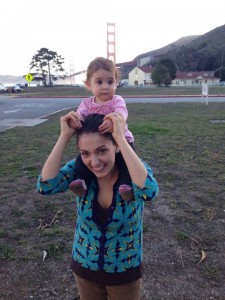 Like many bedsharing parents, I’ve had conversations where I let people assume my daughter sleeps in a crib.
Like many bedsharing parents, I’ve had conversations where I let people assume my daughter sleeps in a crib.
While I love our family bed, sometimes I just don’t want to get into the details of why I’m not afraid of suffocating my child and when and where I have sex. So I smile and nod when strangers refer to a crib that does not exist.
My husband doesn’t do this. Anyone who assumes our daughter sleeps in her own room gets immediately corrected and, if they question our choice, engaged in a lively debate.
I love this about him. It’s dads like him who break down misconceptions about Attachment Parenting (AP) and gender.
One of the most common criticisms of Attachment Parenting is that it undermines women’s place in society by demanding too much of mothers, forcing them to abandon any interests and identity outside of motherhood. But women who self-identify as feminists are more likely to practice Attachment Parenting than women who identify as non-feminist. The disconnect between criticism and reality comes from critics’ own assumptions about AP families: They assume Mom is doing it all.
Enter the AP Dad.
Maybe he is feeding the baby a bottle of pumped breast milk, with love and respect of course, while mom is at work. Maybe he’s running errands with an infant cuddled up to him in a sling. Or maybe he’s snuggling up with a toddler in bed at the end of the day.
When Mom is out of the house, he’s not “babysitting” — he’s parenting.
The assumption that he’s not, hurts all of us. This misconception about Attachment Parenting leads families away from a parenting approach that may be better for their children. It places undue pressure on mothers through a societal assumption that they are doing all the parenting. And it’s disrespectful to dads who take on their fair share of parenting responsibilities.
Even those of us in families where fathers pull their own parenting weight expect other people to assume that they’re not. As an API Leader, the most common question I’m asked is, if dads are allowed at API Support Groups. Dads need parenting support, too, but the societal expectation that Mom is doing all the parenting is so strong that we hear “parenting support group” and think “mothers’ support group.”
It is within this zeitgeist that my husband is brave for being a proud bedsharing dad. When people hear a man sleeps in a family bed, there’s often an assumption that his wife made him do it, that he was against it and that he’s never going to have sex again.
They discount the possibility that a father-to-be would research parenting options, discuss them with his partner and together they would make a decision on the sleep arrangements that they feel are best for their family.
In reality, this is how almost every family I know operates. The more apparent it becomes that a couple operates as a team, the less Attachment Parenting appears to put an undue burden on mothers.
So be proud, AP Dad! You’ll be helping out AP families everywhere. Plus, you get to end your day with snuggles.
